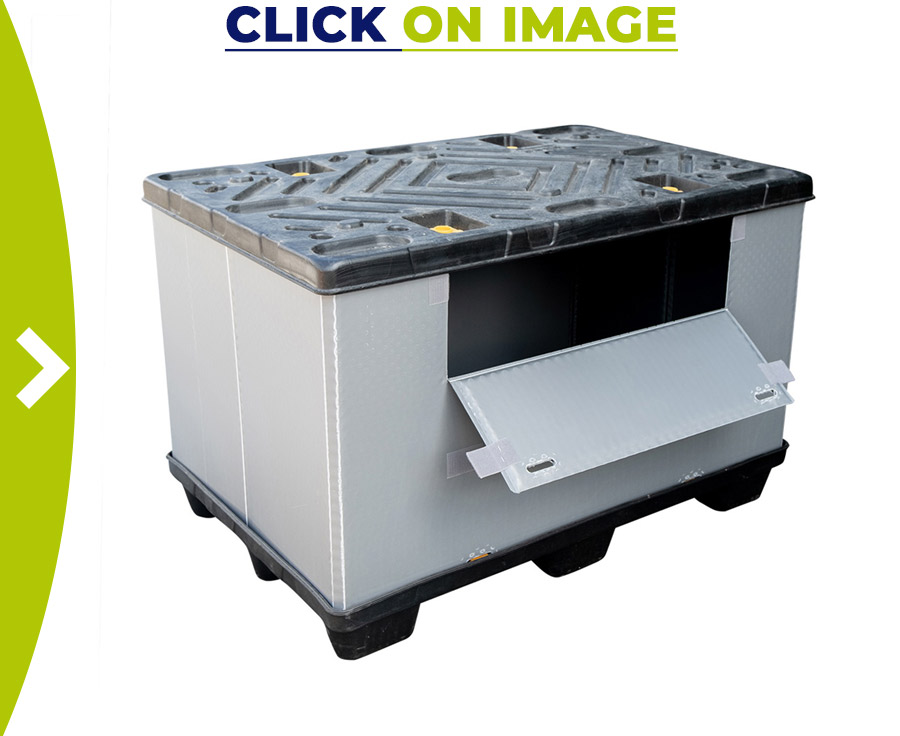Wear, Damage & Maintenance – How to Keep Your Pallet Boxes Safe and Long-Lasting?
Pallet Boxes Safe. Even the strongest pallet boxes are not indestructible. Daily loading, transport stress, and handling errors leave their mark. Over time, hinges, walls, and bases can weaken. If ignored, this shortens their lifespan and creates safety risks.
Regular maintenance provides a twofold benefit:
- We strengthen our competitive position by keeping packaging costs low.
- We improve our ecological footprint by extending product use and reducing waste.
Research shows that proper maintenance can increase the lifespan of returnable packaging by up to 30–50%. That means fewer replacements, lower costs, and stronger sustainability. According to the European Environment Agency, reusing packaging reduces CO₂ emissions by up to 60% compared to single-use options.
By taking care of our sleeve pallet boxes, steel containers, or roll cages, we directly boost our ROI and contribute to circular economy goals.
What Are the Main Risks for Steel Pallet Boxes?
Steel boxes are robust but not immune to wear. Forklift impacts, heavy loads, and careless stacking are common issues.
Concerns: Hinges and folding joints can stiffen or bend. Mesh panels may warp under forklift pressure.
Prevention:
- Avoid rough forklift entry.
- Check folding joints regularly.
- Oil hinges to prevent stiffness.
Repair: If frames or mesh break, they can be repaired instead of replaced.
Steel pallet boxes can last for years when checked frequently. Preventive care saves money and reduces downtime.
How Can We Keep Foldable Gitterboxes in Shape?
Gitterboxes are foldable, stackable, and widely used. But daily stress can damage them.
Concerns: Hinges may bend, and folding joints stiffen. Mesh can deform after impact.
Tips:
- Use forklifts carefully.
- Check hinges before stacking.
- Oil folding joints at least once a month.
Repair: Warped mesh and bent frames can be restored by professionals.
Fact: Studies show that repaired gitterboxes can perform at 95% of their original strength. Choosing repair instead of replacement cuts waste and saves money.
What About Mesh Wire Cages?
Mesh wire cages are often used for irregular or sharp items. Yet they face unique stress.
Concerns: Wire may break after repeated heavy loading. Doors and latches loosen over time.
Take care of:
- Distribute loads evenly.
- Secure doors during transport.
- Avoid dragging cages on rough floors.
Repair option: Broken mesh parts and faulty latches can be replaced.
Mesh wire cages are simple to fix. This makes them a cost-effective part of long-term logistics strategies.
How to Maintain Pallet Walls and Stacking Frames?
Pallet walls and stacking frames are flexible solutions but vulnerable under misuse.
Pallet walls concerns: Metal walls may warp if overloaded or dropped. Hinges weaken with age.
Care tips:
1. Respect load limits.
2. Check hinge alignment before stacking.
3. Store dry to avoid corrosion.
Stacking frames concerns: Misaligned stacking bends frames. Weld seams loosen under pressure.
Care tips:
- Align frames before loading.
- Avoid over-stacking.
- Check weld seams regularly.
Properly maintained, these units last up to five times longer than neglected ones.
What Are the Weak Spots of Roll Cages?
Roll cages keep logistics moving but have their own wear points.
Concerns: Wheels and casters wear out first. Wire panels can loosen with use.
Prevention:
- Keep wheels clean.
- Replace worn casters early.
- Check for loose panels.
Repair: Broken welds and loose panels can be fixed quickly.
Wheel maintenance alone can extend cage usability by 20–25%.
How Do We Handle Plastic Pallet Boxes Safe and Sleevepacks?
Plastic pallet boxes are light, strong, and foldable. But they still need care.
Sleevepacks concerns: Sleeves may crack at fold lines. Pallets and lids warp if dropped.
Care:
- Fold sleeves carefully.
- Avoid sharp items inside.
- Inspect edges before reuse.
Repair: Cracked sleeves or broken lids can be replaced, keeping sleevepacks in circulation.
Collapsible plastic boxes (e.g., Magnum Optimum):
- Hinges, panels, and latches snap under stress.
- Base pallets can crack from point loads.
Care tips:
- Fold according to instructions.
- Avoid forklift piercing.
- Respect load limits.
Plastic returnables are popular in Europe. Industry reports show sleeve pallet boxes cut storage costs by up to 40% compared to non-collapsible alternatives.
Can Damaged Boxes Always Be Repaired?
Not all damage means replacement. Most issues—hinges, panels, mesh, latches—can be restored. We at Zamko B.V. specialize in repairs that extend lifespan and ensure safety.
According to Google, companies replacing pallet boxes too early spend 20–30% more per year on logistics packaging. Repairing is the smarter choice.
You can contact us directly at +31 40 711 47 17 or visit our contact page: https://zamko.eu/contact-us/.
Stronger, Safer, More Sustainable
Pallet boxes—whether steel or plastic—are built for reuse. But without care, they wear out quickly. With the right maintenance, we gain a double win: stronger competitiveness and a lighter ecological footprint.
By repairing instead of replacing, we save costs, reduce CO₂, and keep packaging in circulation longer. Each inspected hinge, oiled joint, or replaced caster adds years of use.
Sustainable logistics is not just about buying the right boxes. It is about taking care of them every day. At ZAMKO B.V., we believe this mindset helps businesses grow while protecting the planet.
Explore more insights on our LinkedIn page: https://www.linkedin.com/company/zamko/ or call us at +31 40 711 47 17 to discuss your packaging challenges.
Secure your pallet boxes safe and long-lasting life with ZAMKO – your pallet boxes specialist!
Table of Contents
Toggle

